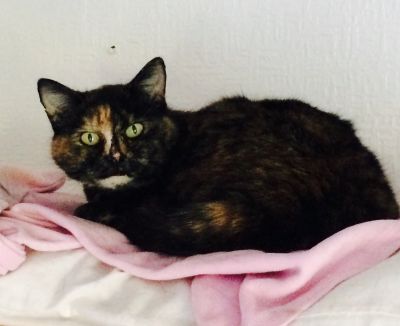
Posted By:
Missy is a 13 year old cat who had been very well looked after and content in her home for her life until over the course of a few months she started showing unusual behaviours. After a trip to the vets a very common condition was diagnosed and then successfully treated with a straight forward but delicate surgery.
Missy had been showing more and more an increased appetite and thirst over several weeks. Not only this, but her behaviour had changed – she would become very vocal, miaowing loudly almost constantly and either wetting the bed or urinating elsewhere in the house. The final straw came when it was noted that Missy was becoming quite skinny, so her owners booked a consultation at the vets.
A fair amount of weight loss was confirmed by the scales at the check up appointment, since her visit for vaccinations last year, and she was displaying quite agitated behaviour, with a faster than usual heart rate. Most importantly on her examination was the appearance of a small lump on her neck beneath her chin. This was suspected to be a goitre, or enlarged thyroid gland, and this finding coupled with the rest of her symptoms, suggested a condition known as hyperthyroidism. A confirmation was achieved via a blood sample which showed an excessive level of thyroid hormone in her circulation.
Hyperthyroidism is a common condition in elderly cats (classed as 11+), in most cases due to a benign tumour of the thyroid gland, and results in an increase in metabolism. This will cause the body to lose weight despite an increased consumption in energy through food and an increased thirst resulting in more urination. The condition can most commonly and easily be treated through either medicine or surgery.
Missy’s owners would struggle to be able to medicate her consistently once or twice a day for the rest of her life with a tablet and were keen to pursue the surgical option. Although an older cat at 13 years old, more and more cats are reaching 20 years old these days with advances in veterinary medicine so the surgery could result in possibly at least five more years of being healthy and free of this condition. Although there is an anaesthetic risk with any animal, and this increases in older patients, the surgery would last for approximately 15 minutes and her body would be supported with an intravenous fluid drip throughout the procedure. If left untreated Missy would continue to lose weight until she was unable to carry on, so she was admitted for her surgery.
To try and reduce anaesthetic risk further, Missy’s thyroid level was attempted to be reduced with a short three week course of medication prior to the operation. Having been prepared for surgery with her neck being shaved once under the general anaesthetic, Missy was taken to theatre. The enlarged thyroid gland was located and carefully removed. However, cats have two thyroid glands either side of the neck and the other gland was noticed to be slightly larger than usual too. To achieve best results the second thyroid gland would need to be removed. Thyroid hormone supplementation would not be necessary as usually there is a small amount of thyroid tissue in a cat’s chest which is enough for a cat to get by on but if both thyroid glands are removed at the same time, this could result in a particularly serious post operative complication.
A smaller gland known as the parathyroid gland that is involved in the control of calcium levels sits next to the thyroid gland and often shares the same blood supply. If the blood supply is cut off during the procedure the parathyroid gland can be damaged which could result in a life threatening drop in blood calcium levels. Low calcium can be shown in an animal by symptoms such as tremors or seizures. This would only be a problem if both glands are damaged – so when removing both thyroids it was really important to be especially delicate.
Fortunately for Missy, the operation was a success and her owner didn't observe any symptoms despite being keenly on guard and monitoring her closely over the next 48 hours. When she arrived for her final post-op check her symptoms of inappropriate urination had disappeared, her appetite had reduced and she was even a little less noisy with her miaowing. Most pleasingly, she had gained quite a bit of weight. The success was ultimately confirmed by a blood test which revealed a reduced thyroid hormone level. Now Missy can live the rest of her hopefully long life less agitated and more like her normal self.
Whilst on my visits I have been having several discussions...
As our feline friends get older there are a few conditions...
Another winter discussion group season is now behind...
©2024 Shepton Veterinary Group Ltd., All rights reserved.
Privacy Policy • Terms & Conditions • Cookie Policy